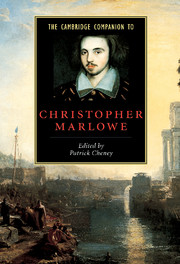Book contents
- Frontmatter
- 1 Introduction: Marlowe in the twenty-first century
- 2 Marlowe’s life
- 3 Marlovian texts and authorship
- 4 Marlowe and style
- 5 Marlowe and the politics of religion
- 6 Marlowe and the English literary scene
- 7 Marlowe’s poems and classicism
- 8 Tamburlaine the Great, Parts One and Two
- 9 The Jew of Malta
- 10 Edward II
- 11 Doctor Faustus
- 12 Dido, Queen of Carthage and The Massacre at Paris
- 13 Tragedy, patronage, and power
- 14 Geography and identity in Marlowe
- 15 Marlowe’s men and women
- 16 Marlowe in theatre and film
- 17 Marlowe’s reception and influence
- Reference Works
- Index
- Series list
- Plate section
5 - Marlowe and the politics of religion
Published online by Cambridge University Press: 28 May 2006
- Frontmatter
- 1 Introduction: Marlowe in the twenty-first century
- 2 Marlowe’s life
- 3 Marlovian texts and authorship
- 4 Marlowe and style
- 5 Marlowe and the politics of religion
- 6 Marlowe and the English literary scene
- 7 Marlowe’s poems and classicism
- 8 Tamburlaine the Great, Parts One and Two
- 9 The Jew of Malta
- 10 Edward II
- 11 Doctor Faustus
- 12 Dido, Queen of Carthage and The Massacre at Paris
- 13 Tragedy, patronage, and power
- 14 Geography and identity in Marlowe
- 15 Marlowe’s men and women
- 16 Marlowe in theatre and film
- 17 Marlowe’s reception and influence
- Reference Works
- Index
- Series list
- Plate section
Summary
It is a critical commonplace that religion and politics were inseparably entwined in Marlowe's England. Queen Elizabeth was 'Supreme Governess' of the Church of England, and the Church of England's leading primate, Archbishop John Whitgift, wielded considerable authority as a member of her Privy Council. Since monarchical rule was divinely sanctioned with the queen herself as God's vice-regent, disobedience to her laws was not just a crime, but a sin against God; conversely, wilful dissent from the Church's official prescriptions of order and worship was not just a sin but a crime against the state. These ideas, of course, constituted the official ideology of the Elizabethan government, but English subjects (as well as foreigners) who disagreed politically with the Crown shared the notion that Church and state, religious and civil authority, sacred and secular values, are intimately and inextricably linked, whether they advocated the queen's overthrow (as Catholics loyal to Rome did after a Papal Bull excommunicated Elizabeth in 1570) or called for the routing of bishops and their hierarchical mode of ecclesiastical polity from the national church (as Puritan radicals did throughout the reign). Not surprisingly, Marlowe represents these complex intersections of religion and politics in his works, questioning many of the verities his audience took for granted about them. In the discussion of this topic which follows, my focus will be primarily on the plays with occasional reference to the poetry and translations.
- Type
- Chapter
- Information
- The Cambridge Companion to Christopher Marlowe , pp. 70 - 89Publisher: Cambridge University PressPrint publication year: 2004



